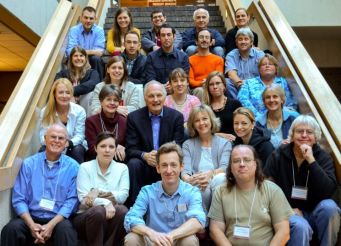Scientists like the minutia. We like details that others don’t pay attention to. We like putting them in tables and graphs, adding them up, and making carefully drawn and appropriately circumscribed conclusions. We report the data in prescribed ways. What we don’t do well is tell a story about the data. If you don’t believe it, ask a scientist to talk to a group of non-scientists about their work (or write impact statements) and see what happens.
Because she knew we needed help telling our stories to the public, my colleague and mentor Carol Ishimaru, in her service as President of the American Phytopathological Society, invited members of the the Alan Alda Center for Communicating Science to lead the plenary session of our national meeting. It was the first time we ever had an activity based plenary and it was a whopping success. It was so beneficial to me that I invested a week in further training at their  Stoneybrook headquarters. The experiment was successful and although you might think that I would have walked away fully engaged and ready to tell my story, what I really got from my experience was a sense of urgency to listen to others tell their stories.
Stoneybrook headquarters. The experiment was successful and although you might think that I would have walked away fully engaged and ready to tell my story, what I really got from my experience was a sense of urgency to listen to others tell their stories.
When I first heard about the plenary, I thought it would teach us to engage the public by using humor. After all the center is known for pioneering the use of improv to improve science communication. It was funny alright, but not in the way I expected. The center uses improv as a way to loosen scientists up so they can talk about their work like humans talk about things they are excited about. The key to these exercises is to have the scientists really pay attention to their listeners and respond to them. In one exercise they demonstrate that in order to make observers see the invisible ball you are passing around, you need to pay attention to how your partner throws ‘the ball’ so that you mimic catching the ball thrown at the same arch and speed. Likewise, in a conversation, they teach, you need to listen to not only what is said, but how a statement is delivered and body language and adjust your own response accordingly. This requires that you really listen and don’t just anticipate what the speaker is going to say. Improv has become a major theme in my professional and personal development work.
The concept of improv has become vital to many aspects of my life. When I am on the top of my game, I am fully engaged in what the other person is saying and care less about getting my point across than I do about hearing and understanding the other person’s view point. This requires that I listen without planning what I am going to say next. It also requires that I take my time to hear and process all of their forms of communication. Of course the next step is asking questions about what I am hearing and seeing to prevent the jump to erroneous conclusions. So many of us go into conversations hearing and responding to what we expect rather than what is actually being said or intended. I witnessed others doing exactly this during meetings this week and recognized one example of it in myself.
For me it is a work in process. As head of the department there are so many things that I need to communicate and so much being thrown my way each day. Using improv principles to approach others has become both harder and more important. But these principles are important to all of our efforts to create consensus and develop or work in teams that function well.
Let’s go forth this week with a new dedication to first seek to understand.
Have a fine week,
Carolee

Hi Carolee.
Love this! I hope you don’t mind that I shared it.
Cheers!
Catherine
LikeLike
Catherine,
I am so please anyone is reading the blog. I mostly develop these topics for my department, but thought there might be others who would like to read them as well. Share away!
LikeLike